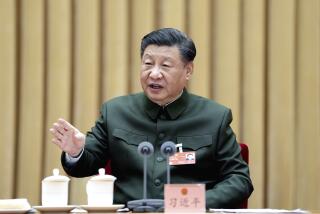China’s democratic path outlined
- Share via
BEIJING — China is on the road to democracy, but not necessarily to Western-style democracy, China’s premier said Friday, citing the country’s unique concerns and the challenge of operating within a socialist framework.
During a rare two-hour meeting with journalists in the cavernous Great Hall of the People, Wen Jiabao delivered a series of messages meant to reassure constituencies inside and outside the country.
One was that the world should not be afraid of China’s growing defense spending despite a missile test that destroyed an aging Chinese weather satellite. He also said China wants to reduce its trade surplus, and he sought to assure Washington that Beijing’s overseas investments would not destabilize the dollar.
China remains committed to economic reform, wants better relations with Japan and seeks a prosperous Hong Kong, an improved environment, better social welfare and universal education, he said.
Interspersed with the notes of reassurance were warnings about the need to fight “splittists” who favor independence for Taiwan and Tibet. China considers democratically governed Taiwan to be a part of its territory. It is sensitive to calls by the Dalai Lama, the exiled Tibetan spiritual leader, for greater Tibetan autonomy. Wen said China would be willing to meet with the Dalai Lama if he recognizes that Tibet and Taiwan are inseparable parts of China.
“This door is always open,” he said.
Democracy, human rights and rule of law are not exclusive to Western countries, Wen added, but rather are a product of human development and history. China wants to encourage creative people who think independently, he said, and it wants a country built on rule of law. Although the country lacks experience in democracy, it is willing to learn from others and aims for greater citizen participation, he said.
“The most important cause [of corruption] is excessive concentration of power, and there is no efficient restriction and supervision over it,” he said. “We therefore need to reform our systems.”
But China should go slowly, he added.
“For socialism to develop from immaturity to maturity ... a very long process is required. It will take a long historical period for an immature, imperfect, underdeveloped socialism to gradually develop into a mature, perfect, developed system,” he said.
During the news conference, carried live on state-run television, Wen displayed the populist touches that have boosted his ratings among a populace accustomed to distant, imperial rulers.
In his opening statement, Wen talked about a letter he received from a primary school student about the premier’s Web surfing, calligraphy and his concern for the health of children.
Chinese leaders rarely give news conferences or interviews, and most of their public appearances are heavily scripted, making Wen’s annual media appearance at the conclusion of the National People’s Congress a relative rarity.
Wen wants to give assurances that the people will be better represented, “but it needs to control the pace,” said Shen Dingli, a professor at Fudan University in Shanghai. “And he seems to be indicating that, while the general situation is improving, we still have problems. All told, it seems quite reasonable.”
Friday’s format, under which reporters were asked to submit their questions in advance, allowed the leader, ranked third in China’s Communist Party hierarchy, to target his message. A politically sensitive question by one foreign reporter about former Premier Zhao Ziyang, tacked onto a more general question about democracy, was deleted from transcripts posted afterward on the Internet.
Zhao, who appeared in Tiananmen Square in 1989 with pro-democracy students, was discredited by hard-liners, who stripped him of his posts and placed him under house arrest. He died in early 2005. Zhao’s fate is especially sensitive for Wen, a former Zhao aide who visited the square with him.
Many of Wen’s answers, which were delivered without notes and seemingly off the cuff, included aphorisms and quotations from ancient and modern poets, with water a central theme. Citing the hoped-for benefits of his administration’s policies, Wen quoted a modern Chinese poet: “If you ask me what happiness means, I tell you to ask ... a river that’s no longer frozen.”
Referring to China’s many disadvantaged people, he said, “The speed of a fleet is not determined by the fastest vessel, rather it is determined by the slowest one.”
And in response to a question about corruption, he cited an ancient Chinese verse: “While water can carry a boat, it can also overturn it.”
On economic issues, his direct area of responsibility, Wen warned that many parts of the economy are plagued by structural problems, including rapid growth, excessive reliance on exports and uneven development. In the wake of this month’s sharp drop in the Shanghai bourse that sent stock markets around the world reeling, Wen said China needed higher-quality listed companies and better-regulated markets.
More to Read
Sign up for Essential California
The most important California stories and recommendations in your inbox every morning.
You may occasionally receive promotional content from the Los Angeles Times.










